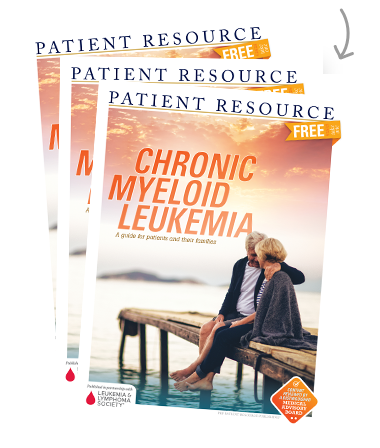Chronic Myeloid Leukemia
Clinical Trials
Depending on your CML diagnosis, phase of the disease and other factors, you and your doctor may consider a clinical trial. When you discuss this potential option with your health care team, it may boost your confidence to have a basic understanding of clinical trials and how they work.
What Are Clinical Trials?
Clinical trials are research studies that help doctors and researchers find new ways to prevent, diagnose and treat cancer. They are designed to improve many aspects of cancer care, such as the following:
- The safety and efficacy of new treatments
- Whether new treatments work better than current treatments
- Prevention
- Diagnosis
- Side effect management
- Quality of life
There are many reasons to consider a clinical trial:
- You or a loved one needs treatment for any stage of cancer.
- By simply participating, you would contribute to the future of cancer care.
- You could gain access to a treatment that works better than the one you currently take.
- Your specific cancer has limited treatment options, and a trial could increase your options.
- You would like to improve the side effects of treatment or the cancer itself.
-
Keep in mind that, as with any cancer treatment, the treatments used in clinical trials may present risks:
- The treatment used may cause side effects.
- There is no guarantee that a clinical trial will be successful for you, even if it has worked for other people with your type and stage of cancer.
- The trial may require more office visits, tests or procedures, which could present challenges in terms of work, school, travel or transportation.
Next Steps
If you are interested in learning more about CML clinical trials, you have several options:
- Ask your medical team if you may be a candidate for a clinical trial. If your medical team is not aware of a clinical trial for you, you may consider getting a second opinion.
- Search reputable sources online. Clinical studies can be sponsored by pharmaceutical companies, academic medical centers, federal agencies such as the National Institutes of Health, the U.S. Department of Defense and the U.S. Department of Veterans Affairs, as well as other organizations. Use the list below to check the availability of trials that may apply to you.
- Be aware that you must meet certain eligibility criteria to be admitted to a trial. This is important because patients in each clinical trial must be similar in many ways to ensure the data collected and conclusions drawn are valid. The criteria may include, but are not limited to, exact diagnosis, previous treatments, general health and personal characteristics, such as age and existing health conditions. You may be required to have certain tests or procedures.
-
It is possible that though you may potentially benefit from a clinical trial, you do not qualify. Some of the reasons include the following:
- You may not meet the required eligibility criteria.
- You may be too sick or have other problems that keep you from participating.
- The trial may already be full. In some cases, your doctor may ask the study sponsor or clinical investigator for an eligibility waiver or special exception to allow you to take part in the study. If you are granted a waiver, you would be treated according to the study protocol (the same tests, doctor’s visits, follow-up, etc.), but your results are not included in the final study results. Sometimes, it is possible for patients who desperately need treatments to gain access to late-phase clinical trials. This is known as expanded access or compassionate use.
MYTHS VS. FACTS
Now that you know what clinical trials are in general, it is also important to know what they are not. Many misconceptions surround clinical trials and, unfortunately, incorrect information could prevent you from getting the best available care.
Following are common myths about clinical trials. Discuss these and other concerns with your medical team. Being informed is key to moving forward with confidence.
MYTH: Once I start a clinical trial, I can’t leave.
FACT: You can stop participating at any time, for any reason.
MYTH: I could get a placebo instead of effective cancer treatment.
FACT: Placebos are rarely used alone in cancer clinical trials unless there is no known treatment. You can always expect to receive at least the standard-of-care treatment for your diagnosis.
MYTH: Clinical trials aren’t safe.
FACT: Many safeguards are in place during clinical trials. Monitoring by special groups throughout the clinical trial process ensures participants are protected.
MYTH: Clinical trials are too expensive.
FACT: Before turning down a clinical trial because of potential costs, talk with your insurance provider about your coverage. Health insurance and Medicare (if applicable) may cover the routine costs of care, including care within a clinical trial. In some cases, the study sponsor may absorb the cost of the treatment and may pay for special tests and additional medical visits.
Clinical Trial Resources
- ClinicalTrials.gov: www.clinicaltrials.gov
- The Leukemia & Lymphoma Society: www.lls.org/ctsc
- National Cancer Institute: www.cancer.gov/clinicaltrials
- NCI Cancer Information Service: 800-422-6237



